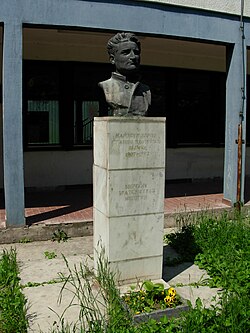User:CallOfPavle/Stanko Paunovic Veljko
Stanko Paunovic Veljko (October 16, 1907 — August 1942), was a national liberation struggle participant,KPJ member, revolutionary, political prisoner, political commissioner of the Fruškorska Partisan Squad and hero of Yugoslavia.
Biography[edit]
He was born on October 16, 1907 in Brestovac near Negotin to father Milan and mother Mitka, as the fourth of seven children in a poor farming family. Father Milan, as a soldier of the 13th Hajduk Veljko Regiment, was captured in World War I fighting Bulgarians and never returned from captivity.

As a 10-year-old, Stanko kept cattle and served in wealthier country houses along with his brothers Stojan and Stanoje.
His uncle, Zivojin Stojanovic, in agreement with his mother Mitka in 1919, brought him to Negotin, together with his seven-year-old brother Vlado, to the newly established Home for Housing War Orphans. He spent just over four years in the dorm. [1]
In Negotin, he finished elementary school, which he started in his native Brestovac. In 1923, together with a group of tame men from the home, he left for Niš, where he became a first-generation student of the Railway Craft School. There he studied mechanical and locksmith craft with excellent success, in 1926, and in that town he got a job as a metallurgical worker.
Political work[edit]
As a young man, he joined the revolutionary labor movement and was active as a member of the League of Socialist Youth of Yugoslavia from 1924 to 1925. In 1927 he was a member of the LSYY District Committee and, in September 1928, a delegate at the Provincial Conference of LSYY for Serbia in Belgrade. He was actively involved in football, first at the Workers' Football Club "Proleter", and then as the first team of the Radnicki football team. Ahead of the introduction of the 6 January dictatorship, he received an invitation to serve in the military, and he left for Slavonski Brod.

In 1929, he was arrested and sentenced by the Court of Protection to a total of 16 years in prison. The Court of State Protection sentenced him to 12 years in prison, but his sentence was commuted to 14 when he shouted, "Long live communism!" when he was told that verdict, Stanko told the judges, "I'm not afraid of your prison, gentlemen! You judge now, but there will come a time when we will judge you. No, I'm not afraid of the cell, remember, even if it's heavy. I am convinced that the proletariat will one day set me free!" the court withdrew for a second time for "inflicting insults" on Stanko Paunovic, who was sentenced to 16 years in prison, which he served in Sremska Mitrovica and Lepoglava, along with Mosha Piada, Ognjen Prica, Rodoljub Colakovic and other communists.
Death[edit]
Since the Invasion and the occupation of Yugoslavia began while in prison, on 22 August 1941, he was one of the organisers and a participant in the escape of convict-communists from prison in Sremska Mitrovica. Thus he joined The People's Liberation Struggle of the People of Yugoslavia and in Sremska he led Partisan actions and was a member of the KPJ District Committee for the area. In the newly formed F Fruška Gora partisan detachment with Jovan Veselinov and Marjan Stilinović , he published the newspaper "Fruškogorski partizan" in which he first signs the illegal name Veljko, inspired by Hajduk Veljko. He was a member of the KPJ District Committee for Srem and political commissioner of the NOPO Headquarters for Sremska.
He died on August 31, 1942 at a place called Stručica, just outside Rakovac, during an enemy offensive on Fruška Gora. He was buried at the site of his death, and later his remains were transferred and buried in a common tomb at the Memorial Cemetery in Sremska Mitrovica, which was erected in 1960, according to a project by Belgrade architect Bogdan Bogdanovic.

Some other notable figures are buried in this cemetery; folk heroes like Paunović and painter Sava Šumanović
With the decision of the Supreme Headquarters NOV and POJ, and at the suggestion of the Headquarters NOV and PO Vojvodina, he was declared a hero, on October 25, 1943, together with other prominent fighters from Vojvodina — Sonja Marinkovic, Radivoje Cirpanov and others.
Memorials[edit]
In the centre of Sremska Mitrovica in 1945, a monument was erected to three folk heroes, Stanko Paunović, Boško Palkovljević Pinki and Janko Cmelik. In 1949, locals in the village of Vizica in Srem erected a memorial plaque on the building of the local office from which Stanko spoke to the people about the fight against the occupiers.
In 1951, a bust was erected for him in Nis.

In Negotin in 1954, a memorial bust was erected in the courtyard of the home where he spent more than four years, and the home bears stanko Paunović's name.
A memorial plaque was erected at his home in Brestovac near Negotino, and a memorial bust, the work of sculptor Periša Milić, was unveiled in Negotin with the folk heroes Vera Radosavljević Nada, Branko Perić and Ljubomir Ljube Nešić.
At the site where Stanko Paunović, Djordje Marković Djilas and Vencel Hunjadi Franjo died, in Strucica near Rakovac, the monument was erected in 1972.
Stanko Paunovic's name carries streets in Negotin, Novi Sad, Sremska Mitrovica, Pančevo, Belgrade and elsewhere.
Gallery[edit]
References[edit]
[[Category:Yugoslav Partisans]] [[Category:Serbian communists]] [[Category:People from Negotin]] [[Category:1942 deaths]] [[Category:1907 births]]









